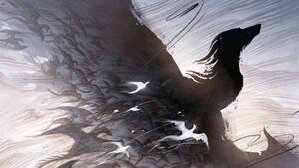Armada by Ernest Cline
Ernest Cline, photo by Dan Winters
Ernest Cline’s July release, Armada, had big shoes to fill: from the oversized footprint made by Cline’s best-selling first book, Ready Player One, to the canonical imprints of alien-fighting gamer classics like Ender’s Game and The Last Starfighter. Like his first book, Armada is told through the voice of an irreverent, underdog teenager with an encyclopedic knowledge of all things 1980’s (I was born in the 1980’s, and can’t recall much beyond Alf and The Little Mermaid, so these characters make me feel inept when calling myself an 80’s kid). Like many teenage underdogs, he harbors what some might label an unhealthy amount of logged screen time playing video games. In the case of Armada’s young hero, Zach Lightman, though, disappearing into video games to escape school bullies, a bad reputation, and grief over a father’s loss proves crucial to Earth’s hope for salvation from alien invaders.
Cline wastes no time letting us know the aliens are coming: the flying saucer is spotted by Zach in the book’s first sentence, as he sits in math class. Because of Zach’s elite gaming skills, he’s recruited and promoted through the Earth Defense Alliance, a secret organization that’s been training members of the human race to defend themselves through, you guessed it, video games. The timeline of the book is tight, spanning only a 24 hour period that is peppered with virtual, drone, and manned dog fights between our hero and the intergalactic squids of Europa (or are they? Zach has his doubts regarding the military-relayed truth of the aliens’ origins and motives). Unable to fully picture what a Glaive fighter or a robot Basilisk look like, I found myself skimming much of the fight sequences to get to the character interactions, Zach’s moments of introspection, and warfare strategizing. This means I skimmed a large portion of the book, as the action play-by-play’s meant less to me than discovering the potential mystery behind the Europan’s aggression against Earthlings. The short time frame also meant less time spent getting to know and care about each character, a loss I lamented more than some of their inevitable deaths.
I won’t reread the book with love as I did Ready Player One, but I would go see the movie, and considering the book stands as an homage to science-fiction books, music, and films of the Star Wars era, I’d call that a victory for the book’s true protagonist: 1980’s nostalgia.












Cadwell Turnbull's new novel — the first in a trilogy — imagines the hard, uncertain work of a fantastical justice.